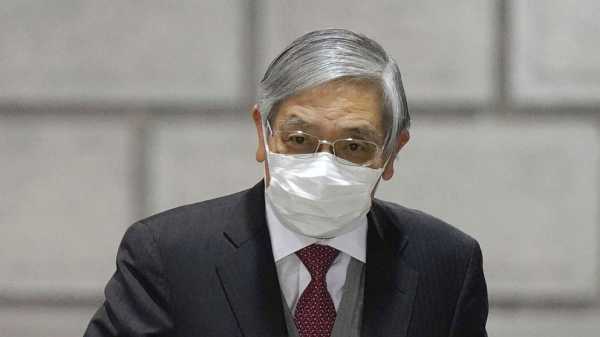
BANGKOK — World shares were mixed Wednesday, with Tokyo gaining more than 2% after Japan’s central bank kept its lax monetary policy unchanged, dispelling speculation it would yield to pressure to tighten credit to counter rising inflation.
Germany's DAX lost 0.1% to 15,170.03 and the CAC 40 in Paris was down less than 2 points, at 7,075.91. Britain's FTSE 100 also was nearly unchanged, at 7,850.12.
The futures for the S&P 500 and Dow Jones Industrial Average were nearly unchanged.
The Bank of Japan shook markets in December with a surprise widening of its target range for yields on long-term government bonds, part of its “yield curve control policy." It kept that range in its latest policy statement, despite recent cases when yields on 10-year government bonds exceeded the 0.5% upward or downward daily limit.
With Wednesday’s decision, the BOJ’s key interest rate remains at minus 0.1%.
“In keeping its key rate and yield curve control policy unchanged at today's meeting, the Bank of Japan probably wanted to convey a message to the market: don't fight the BOJ," economists at ING Economics said in a report.
Inflation has been more subdued in Japan than in the U.S. and many other countries, but prices have been creeping up as costs for oil and gas and other imports have risen. Moves by other central banks to raise interest rates to snuff out decades-high inflation have pulled the value of the Japanese yen lower, another strain on Tokyo's monetary stance.
Core inflation in Japan, excluding volatile food and energy costs, is forecast to rise to 1.8% in the fiscal year ending in March, and wages have not risen much.
“Concerning risks to the outlook, there remain extremely high uncertainties for Japan’s economy," said a BOJ statement. It cited threats from rising interest rates, disruptions from the war in Ukraine and persisting disruptions from the pandemic as major reasons for concern.
Still, expectations of a change in the longstanding easy money policy, aimed at fending off deflation, have been building as market watchers await the departure of BOJ Gov. Haruhiko Kuroda, who is due to step down in April.
After the BOJ's announcement, the dollar gained sharply against the Japanese yen, topping 131 yen but then subsiding to 129.81 yen, up from 128.17 yen late Tuesday.
The Nikkei 225 in Tokyo gained 2.5% to 26,791.12. Australia's S&P/ASX 200 edged 0.1% higher to 7,393.40, while the Hang Seng in Hong Kong rose 0.5% to 21,678.00. The Shanghai Composite index was virtually unchanged, at 3,224.41.
Bangkok's SET gained 0.1% while the Sensex in Mumbai was up 0.6%.
On Wall Street, stock indexes closed mixed Tuesday as investors focused on a busy week of corporate earnings for insight into how much damage inflation is inflicting on the economy.
The S&P 500 slipped 0.2%, ending a four-day winning streak. The Dow Jones Industrial Average fell 1.1%, while strength in technology stocks helped the Nasdaq composite eke out a 0.1% gain. The Russell 2000 index fell 0.1%.
Markets were closed Monday for a holiday. The year has gotten off to a solid start for Wall Street after a dismal 2022, but investor sentiment could quickly turn as companies report their results for the October-December quarter.
Analysts expect companies in the S&P 500 to report a drop in profits for the fourth quarter from a year earlier. That would mark the first such decline since 2020, when the pandemic was crushing the economy.
Among the companies reporting their latest results this week: Netflix, M&T Bank and Procter & Gamble.
Inflation and how the Federal Reserve will continue its fight against high prices remain the big concerns for investors as they review earnings results and corporate statements.
Wall Street will get another inflation update on Wednesday, when the government issues its December report on inflation at the wholesale level, which tracks prices before they are passed on to consumers. The government will also release retail sales data for December, which could give investors more insight into how inflation is affecting consumer spending.
Consumer inflation has been easing for six straight months, raising hopes the Fed could soon consider softening its policy on interest rates, even though it has said it will keep raising rates this year and expects no rate cuts until 2024.
In other trading, U.S. benchmark crude gained 69 cents to $80.87 per barrel in electronic trading on the New York Mercantile Exchange. It added 32 cents to $80.18 per barrel on Tuesday.
Brent crude, the pricing standard for international trading, was up 52 cents at $86.44 per barrel.
The euro rose to $1.0839 from $1.0790.
Sourse: abcnews.go.com






